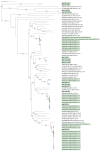Genome Variability of Infectious Bronchitis Virus in Mexico: High Lineage Diversity and Recurrent Recombination
- PMID: 37515267
- PMCID: PMC10386725
- DOI: 10.3390/v15071581
Genome Variability of Infectious Bronchitis Virus in Mexico: High Lineage Diversity and Recurrent Recombination
Abstract
The avian infectious bronchitis virus (IBV) is a coronavirus that mutates frequently, leading to a contagious and acute disease that results in economic losses to the global poultry industry. Due to its genetic and serological diversity, IBV poses a challenge in preventing and controlling the pathogen. The full-length S1 sequence analysis identifies seven main genotypes (GI-GVII) comprising 35 viral lineages. In addition to the previously described lineage, a new GI lineage (GI-30) and two lineages from novel genotypes (GVIII-1 and GIX-1) have been described in Mexico. To prevent the spread of IBV outbreaks in a specific geographic location and select the suitable vaccine, it is helpful to genetically identify the circulating IBV types. Moreover, sequencing genomes can provide essential insights into virus evolution and significantly enhance our understanding of IBV variability. However, only genomes of previously described lineages (GI-1, GI-9, GI-13, and GI-17) have been reported for Mexican strains. Here, we sequenced new genomes from Mexican lineages, including the indigenous GI-30, GVIII-1, and GIX-1 lineages. Comparative genomics reveals that Mexico has relatively homogenous lineages (i.e., GI-13), some with greater variability (i.e., GI-1 and GI-9), and others extremely divergent (GI-30, GVIII-1, and GIX-1). The circulating lineages and intra-lineage variability support the unique diversity and dynamic of Mexican IBV.
Keywords: IBV; Mexico; genomes; lineages.
Conflict of interest statement
The authors declare no conflict of interest.
Figures



References
Publication types
MeSH terms
LinkOut - more resources
Full Text Sources
Research Materials

